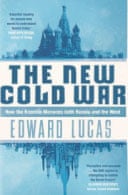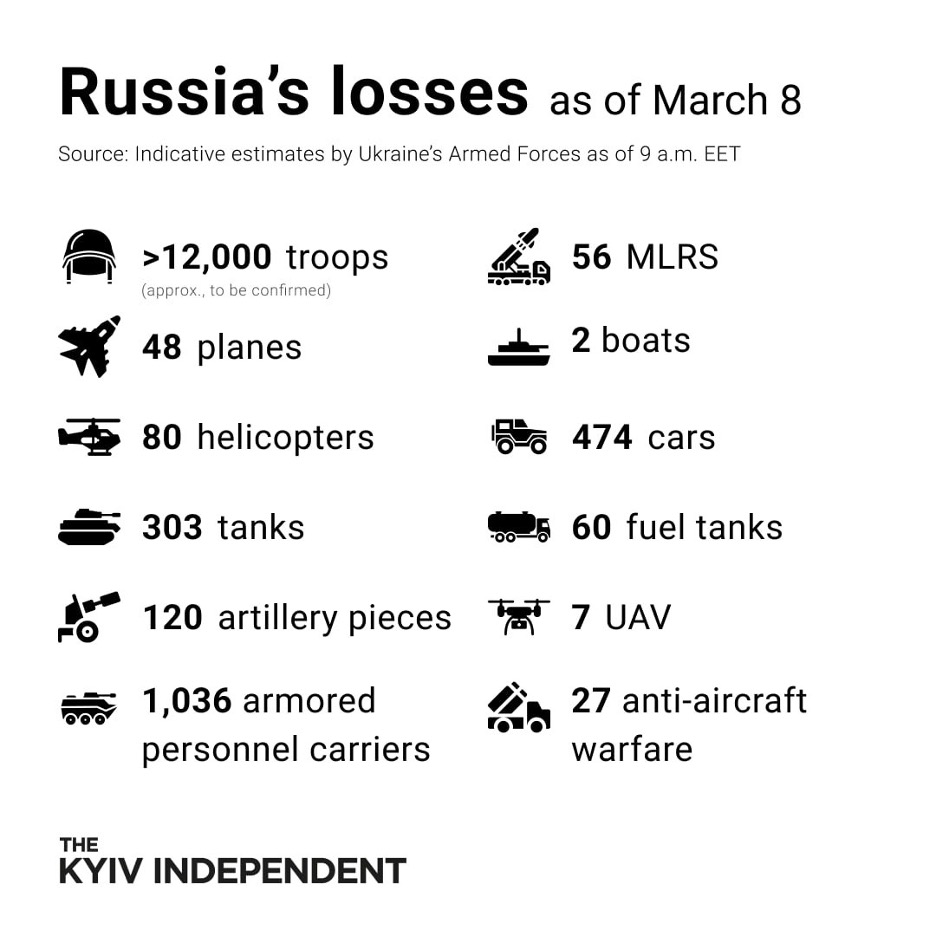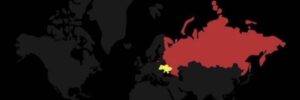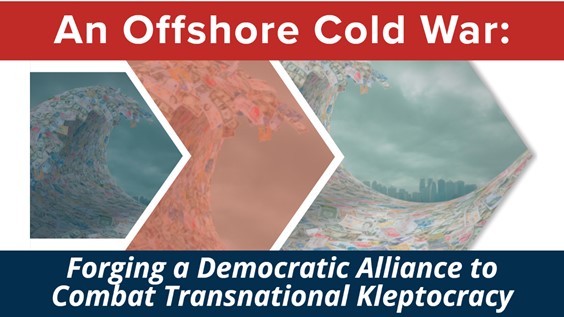The way a regime treats its own people is often indicative of how it will act toward other nations. Vladimir Putin has provided us with a tragic reminder of this correlation through his unprovoked and unjustified invasion of Ukraine, notes David J. Kramer, Managing Director for Global Policy at the George W. Bush Institute and former Assistant Secretary of State for Democracy, Human Rights and Labor.
It can be tempting, watching from thousands of miles away, to conclude that as long as the Ukrainians are fighting and dying for the cause of freedom, we are winning. This is false. We only win when Ukraine succeeds, and Ukraine’s future as a successful democracy becomes more endangered with every murder of a civilian, every bombing of an apartment, every atrocity committed against its people, he said in testimony to the Tom Lantos Human Right Commission of the U.S. House of Representatives.
 In a stand-off between the west and Russia that many are calling a second cold war, the Baltic states are increasingly viewed as this generation’s West Berlin. A part of Nato territory that may be all but impossible to defend in itself, but which western officials underscore to Moscow will be heavily avenged in the case of any attack, The FT’s Richard Milne reports:
In a stand-off between the west and Russia that many are calling a second cold war, the Baltic states are increasingly viewed as this generation’s West Berlin. A part of Nato territory that may be all but impossible to defend in itself, but which western officials underscore to Moscow will be heavily avenged in the case of any attack, The FT’s Richard Milne reports:
The Estonian and Latvian prime ministers talk of the “naivety” of previous western leaders, thinking that Putin was a politician like them, and instead offering him compromises and showing him weakness. Both are heartened by the unity and strength of the west’s response so far to the invasion of Ukraine.
Latvia’s prime minister Krisjanis Karins is prepared for a lengthy stand-off between democratic Europe and autocratic Russia: “If we don’t stop Putin in Ukraine, Putin will not stop. And any western democracy could be next. “This is a war against democracy,” he says. “It is a war of imperialistic expansion whereby Putin blatantly says he does not respect the right of self-determination of Ukraine. It’s anachronistic but true.”
Putin is moving from a dictatorship of spin to one of fear, said Sergei Guriev, a Professor at Sciences Po and formerly the Chief Economist at the EBRD and Rector of Moscow’s New Economic School. So long as his entourage stays loyal, he may well retain power, however badly his war goes and however painful the sanctions, he observed in a dialogue with Princeton’s Markus Brunnermeier (above).
 Putin’s invasion has had a number of unintended consequences, said Anton Barbashin, a political analyst and editorial director of the journal Riddle Russia.
Putin’s invasion has had a number of unintended consequences, said Anton Barbashin, a political analyst and editorial director of the journal Riddle Russia.
“Whatever was Putin’s end goal in Ukraine, it is already clear that what he has achieved is uniting the West, destroying Russia’s economy, endangering the survival of the Russian state as we know it, almost guaranteed Ukraine’s future inclusion into western institutions and ultimate demise of Russia’s grand power aspirations. To call it a mistake is to say nothing,” he told CNBC in comments Wednesday.
In short, wildly irresponsible overconfidence and sloppiness coursed through the planning and execution of this operation, adds analyst Brian E. Frydenborg. The Russian people owe nothing to this orchestrator of the betrayal of those soldiers and their families, but they owe a great deal to the Russian soldiers and Ukrainians being treated as disposable pawns for the geopolitical ambitions of the dictator they empowered. Only by removing Putin themselves can they restore Russia, in time, to true greatness, but going along with their Dear Leader’s insane playbook will only result in the opposite, he writes for Small Wars Journal.
 Putin is “testing the resolve of NATO, the EU, the G7, and democracies around the world,” said Under Secretary Victoria Nuland (right) in testimony to the Russia’s War on Ukraine Senate Committee on Foreign Relations. “As President Biden said, we are in a battle between democracy and autocracy, and free people, free nations, a free Ukraine must prevail.”
Putin is “testing the resolve of NATO, the EU, the G7, and democracies around the world,” said Under Secretary Victoria Nuland (right) in testimony to the Russia’s War on Ukraine Senate Committee on Foreign Relations. “As President Biden said, we are in a battle between democracy and autocracy, and free people, free nations, a free Ukraine must prevail.”
Putin knows he is vulnerable because “the Russian national tradition is unforgiving of military setbacks,” observed Leon Aron, a Russia expert at the American Enterprise Institute.
“Virtually every major defeat has resulted in radical change,” he wrote in The Washington Post. “The Crimean War (1853-1856) precipitated Emperor Alexander II’s liberal revolution from above. The Russo-Japanese War (1904-1905) brought about the First Russian Revolution. The catastrophe of World War I resulted in Emperor Nicholas II’s abdication and the Bolshevik Revolution. And the war in Afghanistan became a key factor in Soviet leader Mikhail Gorbachev’s reforms.” Withdrawal from Cuba also facilitated Nikita Khrushchev’s removal two years later.
 Kira Rudik (right), a 36-year-old software engineer, member of the Ukrainian government and Stanford graduate had never held a gun before. Now, she carries one daily. With more than 2 million people having fled the country, Rudik has vowed to stay in the capital city of Kyiv and fight if necessary for her country and her people, NBC reports.
Kira Rudik (right), a 36-year-old software engineer, member of the Ukrainian government and Stanford graduate had never held a gun before. Now, she carries one daily. With more than 2 million people having fled the country, Rudik has vowed to stay in the capital city of Kyiv and fight if necessary for her country and her people, NBC reports.
“You do lots of loading and unloading and loading and unloading the gun because you need to be able to do it when your hands are shaking, when bullets are flying all over the place, and you need to be able to do it without even thinking of it.”
“This is what my role as a leader is, this is what I’m doing and this is what I’m going to do,” she said. RTWT
“Putin’s brutal invasion of Ukraine is reshaping the politics of Europe and – possibly – beyond,” Berenberg Bank’s chief economist, Holger Schmieding, noted in a report on the macro impact of the conflict. “The free world seems to be pulling together like rarely before,” he added.
 Even before the war, Russia was starting to show features “of a Soviet style petro-economy with an oversized military sector and ultimately unaffordable imperial ambitions,” he added. The costs of war, domestic repression and Western sanctions “will likely hasten the economic demise of Putin’s Russia much more so and much faster than the costly occupation of Afghanistan contributed to the erosion of Soviet power in the 1980s,” Schmieding wrote.
Even before the war, Russia was starting to show features “of a Soviet style petro-economy with an oversized military sector and ultimately unaffordable imperial ambitions,” he added. The costs of war, domestic repression and Western sanctions “will likely hasten the economic demise of Putin’s Russia much more so and much faster than the costly occupation of Afghanistan contributed to the erosion of Soviet power in the 1980s,” Schmieding wrote.
There are only a few possible ways the Russian attack can end, argues Janice Gross Stein, the Founding Director of the University of Toronto’s Munk School of Global Affairs and Public Policy:
 Ukraine could hold off Russian advances at the cost of terrible civilian casualties but still remain geographically divided.
Ukraine could hold off Russian advances at the cost of terrible civilian casualties but still remain geographically divided.- Putin could negotiate a ceasefire and leave a rump Ukraine in the western part.
- Alternatively, he could subjugate all of Ukraine and then face an ongoing insurgency. It is even possible (although very unlikely) that he could be removed in a palace coup.
- Finally, Putin, cornered, could escalate and widen the war.
In the coming days and weeks, leaders will have to balance the risks of doubling down on deterrence against the risks of deadly escalation, she writes for Foreign Affairs.
Russian funds had been invested in “extending patronage and building influence across a wide sphere of the British establishment — public relations firms, charities, political interests, academia and cultural institutions were all willing beneficiaries of Russian money”. Members of Putin’s inner circle had donated to UK political parties and had “a public profile which positions them to assist Russian influence operations”.

A 2020 report by the UK parliament’s intelligence and security committee found that many British politicians had business interests linked to Moscow, worked directly for major Russian-linked companies, and that a large cohort of advisers, including bankers, lawyers and estate agents, provided services to Russian oligarchs and companies.
The Labour opposition estimates that the ruling Conservative party has received £1.9m from donors who have either “made money from Russia or have alleged links to the Putin regime” since Boris Johnson became prime minister.
The U.K.’s Economic Crime Bill is a weak mishmash of measures in response to demands for a transnational effort against kleptocracy, writes Oliver Bullough, who outlined an argument for opposing kleptocracy as communism was opposed during the Cold War in a paper for the National Endowment for Democracy (discussed here in a video discussion with Heather Conley, President of the German Marshall Fund of the United States, and Damon Wilson, NED President and CEO.)
War in Ukraine: will the Baltics become the ‘new West Berlin’? https://t.co/VCjAd5VaF6
— Democracy Digest (@demdigest) March 9, 2022







